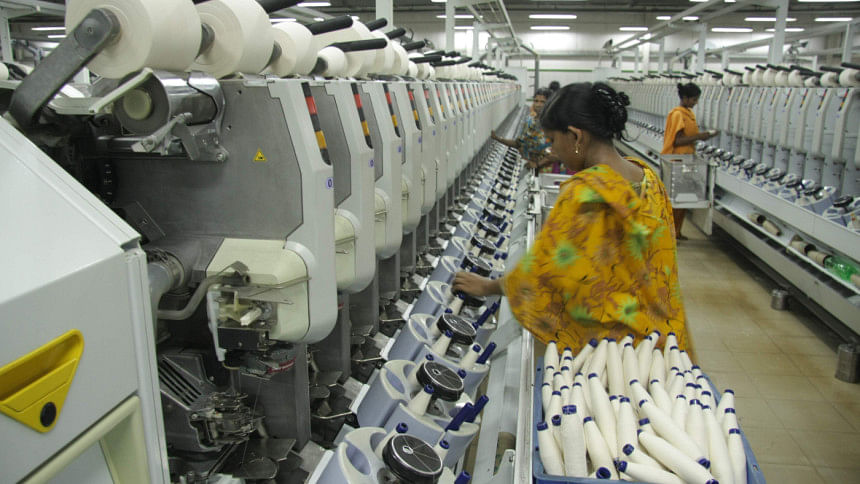Now terry towel exporters seek easy conditions

Terry towel manufacturers and exporters are now demanding easing rules for importing yarn through land ports, as had the Bangladesh Garment Manufacturers and Exporters Association (BGMEA), citing that prices of this basic raw material for manufacturing garments have increased in local markets.
The Bangladesh Terry Towel & Linen Manufacturers and Exporters Association (BTTLMEA) yesterday sent letters to the commerce and finance ministers and secretaries, and National Board of Revenue (NBR) chairman in this regard, focusing on imports from India.
M Shahadat Hossain Sohel, chairman of the BTTLMEA, said they currently had a lot of work orders from international retailers and brands and needed a lot of yarn at competitive prices.
"However, the local spinners are facing difficulties in supplying yarn at competitive prices for which we may lose our work orders to competing countries," Sohel told The Daily Star over the phone.
Sohel said factory owners who did not have bond licences should be given the opportunity to import yarn at a concessional rate so that they could be more competitive in the international markets.
Moreover, like the BGMEA, the BTTLMEA also demanded that the government allow import of yarn from India through major land ports, such as that of Bhomra and Sonamasjid.
The government should improve the infrastructure in those land ports, facilitating warehouses and storage of raw materials like cotton, yarn and fabrics for the apparel industry, it said.
Currently, importers can bring over yarn, cotton and fabrics from India only through Benapole Land Port under the bonded warehouse facility as there was a storage.
Like the BGMEA, the BTTLMEA too demanded that the government allow partial shipment facility through the land ports, including the one in Benapole.
Partial import of raw materials for manufacturing garments is now allowed only through the country's premier sea port of Chattogram.
Partial shipment refers to allowing importing and unloading a portion of a consignment ordered under letters of credit (LCs).
Businesspeople choose partial shipment mainly for timely use of raw materials and to reduce storage and warehousing costs of imported goods.
For instance, imagine an importer opening an LC for importing 100 tonnes of yarn but currently having a capacity to use 50 tonnes.
In that case, he opts for bringing over 50 tonnes for the time being and importing the remaining 50 tonnes later at his convenience.
However, in case of raw material imports not being made through Chattogram port, importers do not have the scope for partial shipments.
So, the importers have to import the whole consignment at one go if those are not unloaded at Chattogram port.
The price of yarn made in Bangladesh for manufacturing terry towels is nearly 40 cents higher on every kilogramme (kg) compared to that in other countries like India and Pakistan, Sohel also said.
Monsoor Ahmed, chief executive officer of Bangladesh Textile Mills Association (BTMA), said his association was also getting ready to explain the factors responsible for the current price of yarn in the local markets.
"We have a plan to sit soon to talk with the stakeholders to discuss the yarn price issue," he said.
Bangladesh should not depend on one or two sources for importing cotton, yarn and fabrics as any disruption could hinder the sector's overall supply at any time without any prior notice, he said.
Such incidents occurred earlier in the case of cotton, he added.
He said allowing partial shipments through the land ports would not be wise as it would open up scopes for irregularities.
The government stopped partial shipments many years ago to prevent the irregularities, Ahmed told The Daily Star over the phone.
Last fiscal year, Bangladesh imported 8.2 million bales of cotton and 326,539 tonnes of yarn in 2020, according to data from the BTMA.
The country's spinners say they can supply 3,500 million kgs of yarn in a year.
Earlier, the BGMEA in a letter to the commerce minister on Sunday said the cost of production has increased by 30.10 per cent over the last eight years.
However, prices of clothing items declined by 3.7 per cent last year manly as a part of the fallouts of the Covid-19 pandemic, it said.
Freight charges went up from anywhere between 100 per cent and 300 per cent during the pandemic. Over the last one and a half years, the local garment exporters have incurred losses catering to work orders, it added.

 For all latest news, follow The Daily Star's Google News channel.
For all latest news, follow The Daily Star's Google News channel. 



Comments